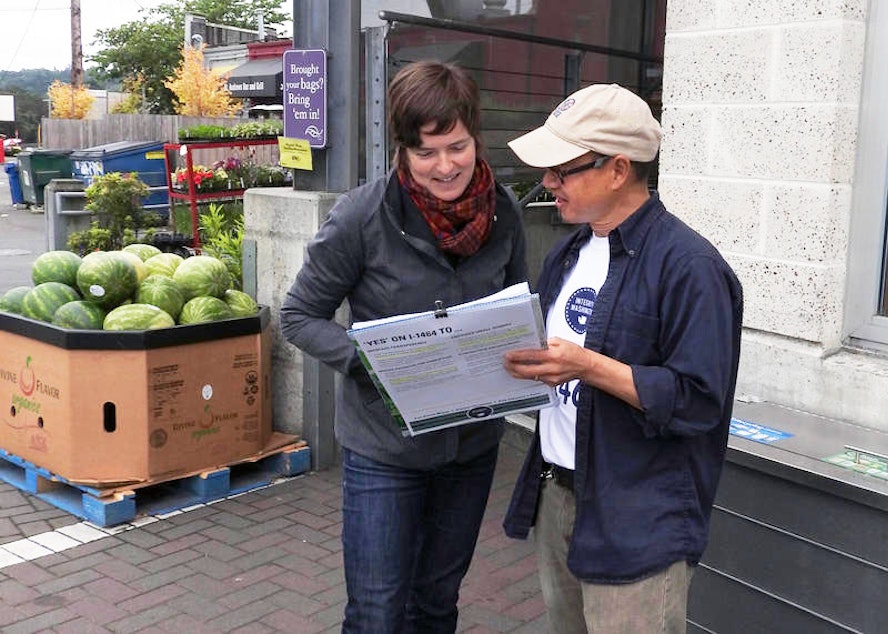What it's like to be that signature gatherer you ignore

If you want to get an initiative on the ballot in Washington state you need a lot of signatures: nearly a quarter million valid ones from registered voters.
And typically, that's going to cost you around a million bucks. If you want to do it cheaper you need people like Jonathan Tong.
TRANSCRIPT
You're on your way into your favorite North Seattle organic grocery story and a signature gatherer is perched just outside the door. But you're in a rush; you've got a lot on your mind.
And you're thinking: "Oh, I know I should talk to him. I just really don't have time right now."
Sponsored
But how is that signature gatherer plotting to get you to stop?
Tong: "You want to say something that can hopefully hook them in the first five, 10 seconds. Because they're already walking past you and you really don't get more than about five, 10 seconds to do it."
Most of the signature gatherers you see around town are hired guns. Two or three bucks per signature is the going rate.
But Jonathan Tong is a volunteer.
Tong: "I've got lot of other things I'd rather be doing on my Saturday afternoons than standing out in front of a store."
Sponsored
This year he's working on a couple of initiatives to try and rein in the influence of money in politics.
The one he is working on today is Initiative 1464. It seeks to strengthen campaign contribution limits and provide for public financing of election campaigns.
Tong: "Gentlemen, how are you? Would you like to help us put an initiative on the ballot to clean up politics in Washington state?"
Tong explains that opening-line strategy.
Tong: "We're trying to go for something that's nonpartisan, not something that sounds like a liberal/Democrat thing or a conservative/Republican thing. Something that all people agree on."
Sponsored
And who doesn't want to "clean up politics" this year? But it turns out it's not that easy to get people to stop and sign even for that cause, even at the PCC, a certified organic grocery store and Seattle co-op.
Tong: "Hi, ladies. How are you? Would you like to help us get 1464 on the ballot to clean up politics in Washington state?
"See I told you: it's got to be like five seconds. I might have to find a new opening line."
How does Tong approach rejection?
Tong: "It's what you do. It's like fishing. You throw the line out there and you know there's going to be a lot of time where you're not reeling in fish. But when you do get somebody to sign it, it really is a good feeling, it's a nice feeling."
Sponsored
Tong also tells me he's selective about where he casts his opening lines:
Tong: "If somebody is walking by who obviously is in a hurry I'm not going to bother taking the time. If I see a mother with a young baby squirming around, I'm not going to bother with that. On the flip side, you recognize somebody's face just from their body language, that they are smiling, that they are not in a hurry."
And then it happens.
Tong: "I'm seeing a friendly face here. I'm feeling good about this.
"Hi ma'am, how are you? Would you like to help us put an initiative on the November ballot? It would help increase transparency in elections, close the revolving door between government and lobbying."
Sponsored
That was more like eight seconds. But it works! Nicole Barthel explains why she stops to sign.
Barthel: "I feel like I have an obligation to get more involved in politics these days, especially nowawadays."
That's one signature. It's not easy work: the rejections, the slow pace, the fact that he has better things to do. So, why do it?
Tong: "I do this for a lot of different reasons but mainly because I have two teenage daughters and I want them to have a decent democracy to inherit when they grow up. I'm also a high school teacher and I want my students to have the kind of democracy they deserve. I want them to have the kind of democracy they think they have when they pledge allegiance to the flag every morning."
Jonathan Tong: He and others are out gathering signatures at grocery stores and parking lots near you.

